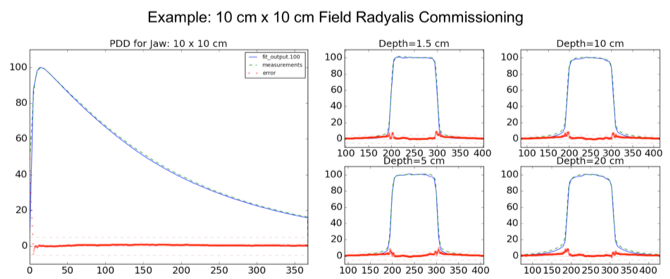Radyalis offers fully automated Monte Carlo commissioning for clinical photon and proton beams.
Commissioning is the process of creating a model for the accelerator output (energy spectra) tuned to match measured dose distributions for a given machine. Phase space or source models are derived through computationally-expensive Monte Carlo simulations of the accelerator treatment head with codes such as BEAMnrc or PRIMO. Such codes require vendor proprietary detailed geometric and material specifications of the accelerator as well as manual tuning to accurately match measurements.
In contrast, Radyalis commissioning only requires knowledge of commonly-available patient-dependent beamline components, e.g. MLC and jaws for photon treatment, and range shifter, magnets, and bolus for proton spot scanning. Radyalis models the accelerator particle distribution, or phase space, after the treatment head or nozzle and thus does not require vendor proprietary accelerator specifications or costly machine-dependent head simulations.
Radyalis commissioning uses the same dosimetry data currently used for routine TPS commissioning, and requires no additional measurements. Proprietary modeling and optimization algorithms efficiently and automatically tune the Monte Carlo for the highest accuracy versus measured dose distributions. For photon commissioning, both flattening and flattening filter free (FFF) configurations are modeled. A typical photon or proton commissioning can be performed to 2%/2mm accuracy versus dosimetry measurements in 4 to 8 hours on a dual-socket workstation, thereby offering significant productivity, confidence, and cost benefits.